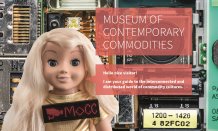Articles

Mikayla has been reprogrammed to enlighten adults (credit Benjamin J Borley)
Smart doll uses ‘espionage’ powers for education
A controversial “smart doll” has been reprogrammed to enlighten adults rather than potentially spying on children.
My Friend Cayla dolls made headlines earlier this year when a German watchdog classified them as “illegal espionage apparatus” and said parents should deactivate them.
But one of the dolls – renamed Mikayla – has been hacked by University of Exeter researchers and can now have different conversations about what she's made from, consumer culture, and the potential and consequences of internet-connected things.
Mikayla will act as guide to visitors at a temporary gallery run by the Museum of Contemporary Commodities (MoCC) – a University of Exeter art-geography research project.
The four-day exhibition, at the Royal Geographical Society in London, will invite people to consider and discuss modern lifestyles and their impact on people and the environment.
“Mikayla is a good example of how science and art can work together to explore urgent questions about how we live, and the social and environmental consequences of that,” said Paula Crutchlow, artist and doctoral researcher in Human Geography at the University of Exeter.
“We've re-programmed the doll to speak in a sophisticated and hopefully witty and entertaining way that engages adults in detailed – and sometimes surreal and bizarre – conversation about commodities, what they are and where they come from.
“The idea is to encourage people to think about consumer culture, ethics and trade injustice – to provoke deeper thought about urgent issues like why and how we make so many things, and who is actually benefitting from the wash of cheap goods we're used to living with.”
The doll is one of a number of digital interactive items that form part of the Museum of Contemporary Commodities.
“The potential for internet-connected smart things to make our daily life activities easier, more convenient or enjoyable is great, especially when we know exactly what they are doing, how and why,” said Ms Crutchlow.
“E-commerce is the fastest growing retail market in Europe and the main issue is what kind of access these objects have to our private lives, who decides what they can 'see' or 'hear' and when, who gets to own and use that data and for what purpose.”
The project brings together Ms Crutchlow's expertise in performance with research in material culture done by Professor Ian Cook.
Professor Cook said: “This idea developed out of our common interests in the ways in which contemporary commodity culture would become tomorrow's heritage.
“We wanted to encourage public discussion about what our ancestors would inherit from our age of globalisation, mass production and mass consumption.
“We were inspired by the Japanese RanKing RankQueen shops which use department store sales data to sell the top three, five or ten best-selling toothbrush holders, sweet potato candies, anything.
“We thought, what if the people visiting our shop donated commodities for display, and then valued them according to their convenience or sense of justice, for example?
“Which ones would rise to the top and what significance would they have for our future heritage and what we value about it?”
The project will be installed at the gallery at the Royal Geographical Society on Exhibition Road, London from August 24-27, open from 10am-4pm each day. Entry is free.
MoCC is being developed in partnership with Furtherfield and a growing number of artists, academics, technologists and members of the public.
The project is funded by University of Exeter, Arts Council England – Lottery Fund, and the Economic and Social Science Research Council.
For more information, visit www.moccguide.net
Date: 16 August 2017
